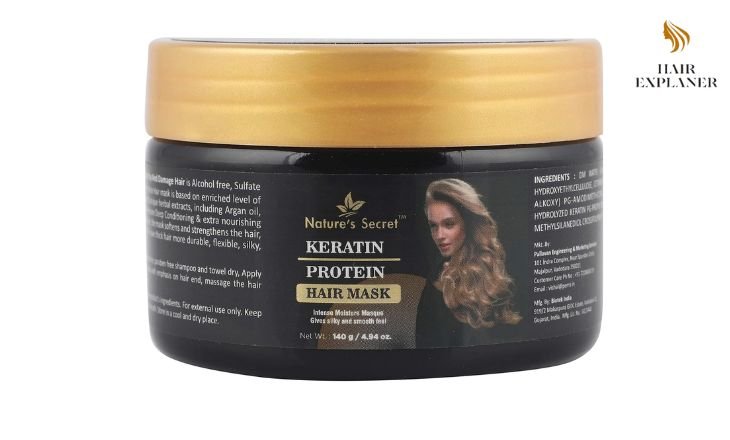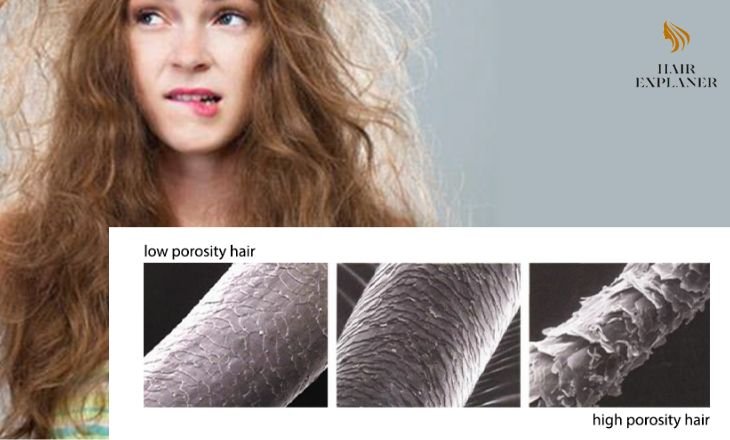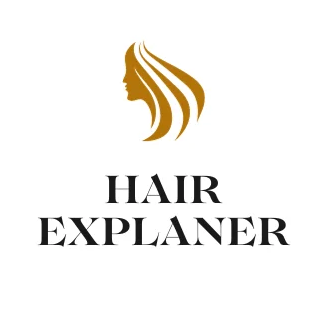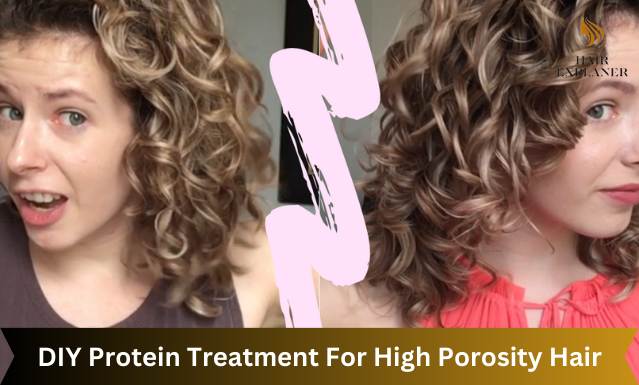Are you struggling with high-porosity hair that absorbs moisture but still feels dry and brittle? Don’t worry; there’s a secret weapon in your kitchen to help you DIY Protein Treatment for High Porosity Hair. With simple ingredients, you can transform your lifeless hair into solid and luscious tresses.
This article will show you how to use protein-packed natural remedies for high-porosity hair, giving you an affordable solution. Say goodbye to dull, damaged hair and hello to revitalized, fortified locks!
DIY Protein Treatment For High Porosity Hair – Recipes
You don’t have to spend much on fancy brands for a good protein treatment.
You can make effective protein masks at home using organic ingredients from your pantry.
Use rich, moisturizing ingredients, as your hair absorbs a lot. Don’t hesitate to use heavy oils and butter.
Egg Yolk, Mayonnaise, And Shea Butter
- 3 egg yolks
- 3 tbsp of mayonnaise
- 3 tbsp of shea butter
Eggs are high in protein, which is good for athletes. The yolks contain the most protein and biotin, which help repair hair damage and prevent breakage and shedding.
Use only the yolks, not the whites. Mayonnaise is very moisturizing and can help hair grow more robust. It also defines curly and wavy hair and protects colour-treated hair.
Shea butter is rich, thick, and moisturizing. It repairs damage by smoothing and sealing gaps in porous hair. Mix all three ingredients to make a smooth paste.
Avocado, Aloe Vera, And Olive Oil
- 2 small avocado
- 3 tbsp of aloe vera gel
- 3 tbsp of olive oil
Avocados contain proteins, amino acids, and fatty acids that strengthen and nourish hair. They also provide deep moisture to prevent dehydration and protect hair from breakage.
Aloe vera gel can be used fresh or from a store. It draws moisture into the hair, hydrating it and soothing the scalp.
Olive oil is a thick conditioning oil that adds shine and helps detangle hair. Mixing avocado, aloe vera gel, and olive oil in a blender creates a creamy mixture that is great for strengthening and growing hair.
Yoghurt, Bananas, Sweet Almond Oil And Honey
- 2/3 cup of yogurt
- 1 banana, mashed
- 2 tsp of sweet almond oil
- 2 tsp of honey
Yoghurt is high in protein, which strengthens hair, and lactic acid, which cleans it. Bananas are full of vitamins, carbohydrates, and potassium, which also strengthen and smooth hair.
Adding sweet almond oil and honey to the mix makes it even more moisturizing. Sweet almond oil hydrates and adds shine to your hair, while honey locks in moisture and fights dandruff.
Combining these ingredients gives you a hair mask that boosts protein and moisture, making your hair shiny and healthy.
Coconut Oil And Coconut Milk
- 1 cup of coconut oil
- ½ cup of coconut milk
In some places, the coconut tree is called the tree of life because its fruit has many benefits. One everyday use of coconuts is for hair care.
Coconuts contain omega fatty acids and proteins, which moisturize and strengthen hair. Coconut oil penetrates the hair to nourish it from the inside.
Coconut milk is smooth and adds shine to hair. Mix a cup of room-temperature coconut oil with half a cup of coconut milk to make a conditioner-like mixture.
What is high porosity hair?
High porosity hair has raised cuticle scales that easily let moisture in and out. This hair type is dry, frizzy, and prone to damage because it can’t retain moisture well. Heat styling, chemicals, and the environment can make the hair even more porous, causing more breakage and split ends.
High porosity hair absorbs products quickly but loses them quickly, so deep conditioning treatments and heavier oils are needed to keep moisture.
Using protein-rich products can strengthen the hair and make it more elastic. Knowing how high-porosity hair works can help you take better care of it, leading to healthier and easier-to-manage hair.
High-porosity hair products
High-porosity hair needs special care. To hydrate and seal the hair, use moisturizing shampoos and conditioners with shea butter, coconut oil, and honey. Deep conditioning treatments are also important to repair and strengthen the hair.
Use leave-in conditioners, serums, or oils for extra moisture and styling protection. Limit heat styling to prevent damage. Adding a protein treatment can improve elasticity and prevent breakage.
Choosing the right products is vital to maintaining healthy hair. Focus on hydration, repair, and protection to manage high-porosity hair effectively and achieve beautiful results.
protein treatment for hair
Protein treatments for hair offer a powerful solution for damaged and weak strands, providing essential nutrients that repair and strengthen the hair shaft.
These treatments contain keratin, collagen, and wheat proteins that penetrate deep into the hair cuticle to rebuild and fortify each strand from within.
Regular protein treatments can help reduce breakage, improve elasticity, and restore overall health to the hair.
It’s important to note that while protein treatments are beneficial for damaged hair, overuse or using the wrong type of treatment can lead to protein overload. Balance is key in incorporating protein treatments into your hair care routine.
Understanding your hair’s specific needs and choosing the right treatment will ensure optimal results without causing any adverse effects. By incorporating protein treatments strategically, you can transform your hair from weak and brittle to strong, resilient, and full of life.
protein hair mask
Protein hair masks have been touted as game-changers in the world of hair care, and for good reason. These masks are packed with essential nutrients that help strengthen the hair shaft, reduce breakage, and promote overall hair health.
One key benefit of protein hair masks is their ability to repair damaged hair, making them a must-have for dry or brittle hair.
diy protein hair mask
One natural and effective way to improve the health of your hair is by using a DIY protein hair mask. This mask can help strengthen and repair damaged hair, leaving it looking shiny and healthy.
The egg is a popular protein-packed ingredient for this mask. It contains essential nutrients like proteins and vitamins that nourish your hair from root to tip.
Egg Yolk, Mayonnaise, And Shea Butter
Protein hair masks are a game-changer for curly hair! Curly hair tends to be drier and more prone to breakage, so incorporating a protein mask into your routine can help strengthen and nourish those coils.
The proteins in the mask penetrate the hair shaft, repairing any damage and adding much-needed moisture.
homemade protein hair mask
A homemade protein hair mask is one of the best-kept secrets for achieving strong, healthy hair. By infusing your locks with natural proteins such as eggs, yoghurt, or avocado, you can nourish and strengthen your hair from root to tip.
These ingredients are rich in essential nutrients that penetrate the hair shaft to repair damage and promote growth.
Regularly applying a protein hair mask improves your hair’s texture and adds shine and elasticity. Incorporating this DIY treatment into your weekly self-care routine can help revive dull, lifeless strands and prevent breakage.
Customizing your protein mask with ingredients like honey or coconut oil also allows you to address specific concerns such as dryness or frizz.
keratin protein hair mask
Applying a keratin protein hair mask can revive dull and damaged hair. This powerful protein helps strengthen the hair shaft, reducing breakage and promoting healthy growth.
Regular use of a keratin hair mask can also help improve your locks’ overall texture and appearance, leaving them smooth, shiny, and more manageable.

hair protein mask at home without egg and coconut oil
Mix mayonnaise with honey and yoghurt to make a hair mask without eggs and coconut oil. Mayonnaise strengthens hair with oils and proteins, honey adds moisture and shine, and yoghurt exfoliates the scalp and promotes healthy hair growth.
Another option is blending avocado with Greek yoghurt and aloe vera gel for a protein-rich mask. Avocados deepen hair with healthy fats and vitamins, Greek yoghurt provides strength with protein, and aloe vera gel soothes the scalp and promotes overall scalp health.
You can experiment with different ingredients to create a personalized hair mask tailored to your needs at home. These natural alternatives are gentle and effective, leaving your hair soft, strong, and nourished without unwanted residue or heaviness.
Hair Protein Treatment
Hair protein treatments are a great way to strengthen and improve your hair. They go deep into the hair shaft and restore important proteins lost from sun, heat, and chemicals. Many people notice shinier and smoother hair after just one treatment. However, it’s important to remember that these treatments should be part of a complete hair care routine that also includes hydration and nourishment.
Regular protein treatments can also help keep your scalp healthy. By strengthening each hair strand, they reduce breakage and shedding, which helps your hair grow better. Choosing plant-based proteins can fit with clean beauty trends and provide similar benefits without harsh chemicals. This combination of nature and science helps you make smart choices for your hair health.
Protein Treatment For Natural Hair
Protein treatments are great for natural hair, especially if styling, the environment, or chemicals damage it. These treatments add important proteins like keratin and collagen, which strengthen hair and improve its elasticity. This leads to less breakage and healthier growth, which is important for anyone with natural hair.
However, it’s important to use protein treatments at the right times and not too often. Using them too much can make hair stiff or brittle, so finding the right balance is key. A good tip is to check your hair’s condition: if it feels limp or you notice a lot of shedding, a deep treatment might help.
Combine protein treatments with moisture boosters. This two-step routine helps strengthen your hair while keeping it soft and shiny. Remember, every head of curls is different, so try different types of protein treatments, from light sprays to thick masks, to see what works best for you. Adding these treatments to your self-care routine not only improves your hair’s health but also helps you connect with it as part of yourself, which is something to celebrate!
high porosity hair examples
High-porosity hair quickly absorbs moisture but struggles to retain it. Chemically treated or heat-damaged hair often has high porosity. Curly or textured hair can also have high porosity due to gaps in the cuticle layer. Despite the challenges, proper care can improve high-porosity hair.
Hydrating products, avoiding heat styling, and deep conditioning treatments can restore moisture balance and enhance the natural curl pattern.
low porosity hair vs high porosity hair
Understanding the difference between low- and high-porosity hair is important for creating the right hair care routine.
Low porosity hair repels moisture, making it hard for products to enter the hair. High porosity hair easily absorbs moisture but struggles to keep it, leading to frizz and dryness. People with low porosity hair can use light products like spritz leave-in conditioners or serums. They can also use heat during deep conditioning to help products absorb better.
People with high porosity hair can benefit from using heavier oils or creams to lock in moisture and reduce frizz. Knowing your hair’s porosity level can significantly impact your hair care routine, helping you choose products and techniques that suit your needs.
Embracing these differences can help you make the most of your curls or waves, resulting in healthier, more manageable, and more shining hair.

protein overload hair
Protein overload in hair is a common issue many people face, especially those who frequently use protein-based treatments. While protein is essential for maintaining strong and healthy hair, too much can lead to brittleness and breakage. Balancing protein and moisture in your hair care routine is important to avoid this problem.
Conclusion
high porosity hair can benefit significantly from regular protein treatments that help strengthen and repair the hair cuticles. By using simple DIY protein treatments at home, individuals with high porosity hair can improve the overall health and appearance of their hair.
It is essential to carefully assess your hair’s needs and choose the right protein treatment that works best for you. With consistency and patience, you can see noticeable improvements in the strength and resilience of your high-porosity hair.
Take the time to invest in your hair’s health by incorporating protein treatments into your regular hair care routine for beautiful, strong, and healthy locks.
Frequently Asked Question
1. How To Use Protein Treatment For Hair?
A protein treatment is a hair care product that infuses hair with proteins to strengthen and repair damaged or weak hair.
2. What adds protein to hair?
Hair care products often contain proteins like keratin, wheat protein, soy protein, vegetable protein, collagen, amino acids, and oat flour to make hair stronger and healthier. Keratin repairs damage and increases flexibility in hair. Wheat protein strengthens hair and reduces breakage, while soy protein supports healthy hair growth with important amino acids.
3. How do you repair damaged hair fast at home overnight?
Repairing damaged hair fast at home overnight requires proper care and nourishing treatments. Start by choosing the right shampoo and conditioner specifically formulated for damaged hair. Look for products that contain hydrating ingredients like argan oil or keratin to help restore moisture and strength to your strands.

